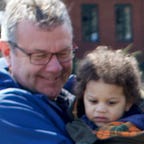The language of love
Trump, with a grand flourish, signed his refugee ban. He chose to do this on Holocaust Remembrance Day, which should be a day of shame for North Americans. After all, we refused to accept Jewish refugees, ostensibly because there potentially (absurdly) might be Nazis or Communists hidden among them.
This is personal. I know refugees.
I’ve known them all my life. My mom grew up in a war zone (a story for another time), and a number of my friends have parents who were Holocaust survivors.
But this also is more immediate.
Two months ago, I went to the airport here in Montreal to wait for my friends and their seven children to arrive. It had taken our church a year to bring them here, filling out forms and waiting, waiting while they were vetted. It was excruciating for us — but, for them, it had been incalculably worse. They had endured four and a half years in a twilight zone, in a place where they received no assistance but were not legally allowed to work.
They had fled after their home in Syria was leveled by the Assad regime while they were in a neighbouring town, where the mom gave birth to their youngest. They weren’t personally targeted, they just happened to live in the wrong place.
Now, as we stood there waiting at the airport, we wondered: what if something goes wrong?
After a couple of hours, another refugee family came out, warmly welcomed by another community, and I desperately asked the immigration official that accompanied them if our family was there. She looked at me, her eyes moist, and asked, “La famille avec beaucoup d’enfants? The one with a lot of children?” “Yes, yes!” “Oui, they’ll be out soon.”
And then they were there, smiling and waving and looking amazingly beautiful after a 24-hour journey (really, a four-and-a-half-year journey). The father embraced me and kissed me on the cheeks. For him — for them — this was not a transaction, this was not about bureaucracy. This was about love.
In the intervening weeks, we have become fast friends, despite one heck of a language barrier. When they arrived, the oldest son spoke some English, and the dad had a smattering of English, but the rest of the family spoke only Arabic. We communicated through some wonderful volunteer translators, and also the dark magic of Google Translate. The new, neural network iteration is not yet available for Arabic, and the translations are often hilarious. Somehow, we managed to communicate just fine.
From the start, we also communicate through food. We’ve eaten at each other’s homes, and also at the church.
Before they arrived, we made sure they understood that success here in Quebec meant speaking French, and ideally also English. They’re enrolled in French classes, and the younger kids are all in “welcome classes,” where they go to school with other new arrivals, children who speak a plethora of languages, with specially trained teachers who will gently guide them to competence in math and all subjects — in French. Now, in addition to our handful of Arabic phrases, we have started to talk to each other in French, especially the children.
What is most striking is the love: the mutual respect and affection within the family, the openness and warmth towards all of us in the church who are working to help them acclimate and integrate. In their hospitality, in their Mediterranean expansiveness, in their shining eyes, they radiate love.
Sadness, too. There are the family and friends left behind, still closely connected on social media but still far away — and in danger. There must be concern about what it means to raise children in Canada, in Quebec, in a very different place.
But.
Today, I’m thinking: What if I still lived in the States? What if the family had been set to arrive today, instead of a mere two months ago? We are awaiting another family, any day now. It’s unimaginable that they might have arrived, safe at last, only to be turned back.
Even stranger that they might have been filtered by religion. The first family is Muslim, the second Christian. Their desperation was equal.
I think of the language of the new U.S. administration and its supporters: pinched, frightened, hateful, cowardly, closed.
And then I think of the language spoken by the refugee family. Open, curious, questioning, loving.
We North Americans think we need to school the world. I think we also have a lot to learn.
I would love to show you pictures of the family, videos of their first time on skis and toboggans, to see their sense of style and their gorgeous smiles, and also to name them. But I want to preserve their privacy.
